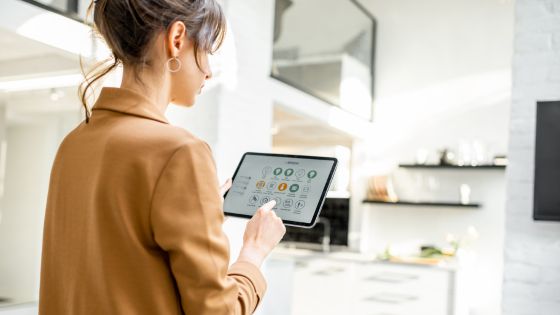In an age where health and well-being are paramount, smart homes are not just about convenience and security; they’re about fostering a healthier lifestyle. From monitoring air quality to encouraging better habits, let’s explore how your smart home can be a cornerstone of your health and wellness journey.
The Foundation of a Healthy Smart Home
The essence of a healthy smart home lies in its ability to adapt and respond to the needs of its inhabitants. By leveraging technology, your home can become an active participant in your quest for a healthier life, providing insights and adjustments to promote well-being.
Air Quality and Environmental Control
Breathing Easy: According to NW Maids, smart air purifiers and HVAC systems can detect and filter out pollutants, ensuring you’re breathing clean, healthy air. This not only improves your overall well-being but can also reduce dust and allergens, making cleaning your home easier and more effective.
Climate Control: Maintaining the ideal temperature and humidity levels is crucial for comfort and health. Smart thermostats adjust these settings to suit your preferences and the changing seasons.
Nutrition and Hydration
Smart Kitchen Gadgets: From smart fridges that track your food’s expiry dates to blenders that count calories, your kitchen can be a hub of nutritional support.
Hydration Reminders: Smart water bottles and connected apps remind you to stay hydrated throughout the day, a simple yet vital aspect of overall health.
Sleep Enhancement
Optimizing Sleep Environment: Smart lighting that mimics natural sunlight patterns can help regulate your circadian rhythm, improving sleep quality.
Monitoring Rest: Sleep trackers integrated into your smart home can provide insights into your sleep patterns, helping you make informed adjustments for a better night’s rest.
Fitness and Activity
In-Home Fitness: Smart fitness equipment and virtual trainers can guide you through workouts, offering convenience and customization to fit your schedule and goals.
Activity Reminders: Your smart home can nudge you to move more, whether it’s time for a stretch break during a long workday or a prompt to take a walk after dinner.
Mental Well-being
Stress Reduction: Smart homes can create relaxing environments, using lighting, music, and temperature to reduce stress and promote relaxation.
Mindfulness Reminders: Set your system to remind you to take time for mindfulness practices, like meditation or deep breathing exercises.
Safety and Accessibility
Emergency Assistance: Smart devices can detect falls or unusual activity and alert emergency services or loved ones, providing peace of mind for you and your family. These same devices, often part of surveillance networks, can also offer valuable assistance features. Voice-activated controls and automated systems make living easier for those with mobility issues, supporting independence and comfort.
Accessibility Features: Voice-activated controls and automated systems make living easier for those with mobility issues, supporting independence and comfort.
Personalized Health Insights
Data at Your Fingertips: With wearable devices syncing to your smart home, you can access a comprehensive view of your health metrics, helping you make informed decisions about your lifestyle.
Customized Advice: Some systems can even provide personalized health advice based on your habits and preferences, turning data into actionable insights.
The Evolving Health Smart Home
The Future of Health Tech: As technology advances, we can expect even more innovative solutions, from AI nutritionists to biometric security systems that monitor your health as they protect your home.
Community and Connection: Future smart homes might not just look after individual health but also connect residents to local health services and community wellness programs, fostering a broader sense of well-being.
Fun Facts to Ponder
- The concept of a “smart home” was first popularized in the 1980s, though it looked quite different from today’s technology.
- Smart refrigerators can now suggest recipes based on the ingredients you have, helping you eat fresh and reduce food waste.
- The global smart home market is expected to exceed $53 billion by 2022, reflecting its growing role in our daily lives.
Your Home, Your Health Sanctuary
Your home is more than just a place to live; it’s a space where life happens, and increasingly, where health is nurtured. Integrating smart technology into your home isn’t just about upgrading your lifestyle; it’s about embracing a future where living healthier is seamlessly woven into the fabric of your daily life. With each smart device and system, you’re not just making your home smarter—you’re making a commitment to a healthier, happier you.













